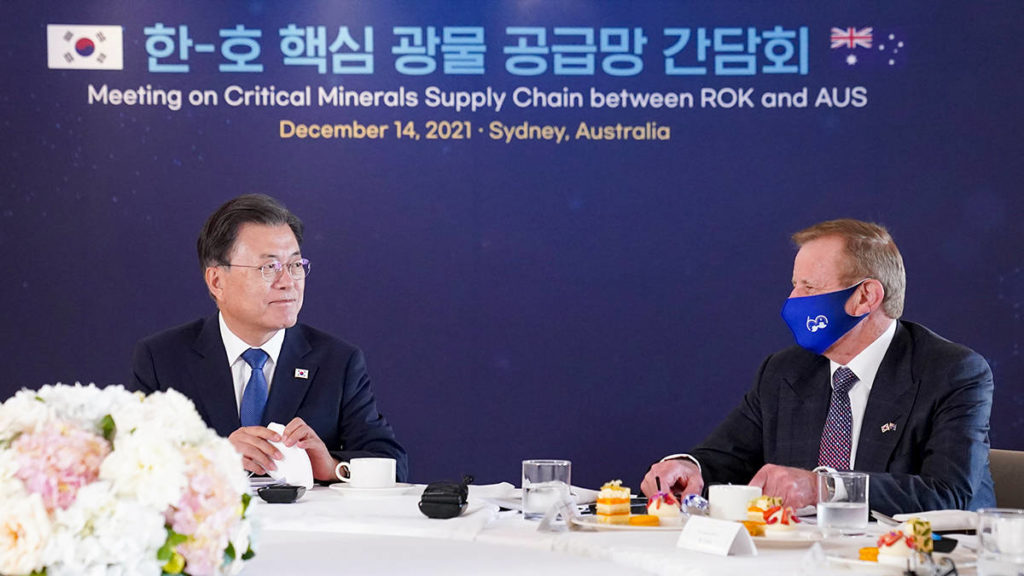Korea could be the Australian critical minerals industry’s righthand man and these companies have a seat at the table
Mining
Mining
This end-of-year rally is due to the limited metal production in China, logistical bottlenecks, and a bullish outlook for battery-sector demand heading into 2022, says Benchmark Mineral Intelligence.
At the same time, rare earth prices have seen decade highs – including the price of neodymium-praseodymium-(NdPr) oxide, which crossed the $US100/kg mark in October and is currently sitting at around $US134/kg.
As demand for these critical minerals rise, South Korea – historically dependant on China for battery minerals – is looking to diversity its supply chain to overcome potential geopolitical and commercial challenges.
Unlocking investment in countries such as Australia makes sense, where it is already one of the country’s largest customers for metals .
Australia supplies 40% of South Korea’s critical mineral imports, which are crucial for many of the components needed to drive the world’s economies to net zero emissions.
According to S&P Global Market Intelligence, more than A$500m in investments have been pledged by South Korean corporates to Australian mining projects in the past two years alone.

Last week a meeting between the Korean president Moon Jae-In and some of the Australia’s most ambitious miners took place, sending a strong signal that the Australia-Korea relationship is a significant one.
It also signifies that the long-term, stable supply of critical minerals is a key priority to Korea, one of the world’s great technology powerhouses.
According to Cobalt Blue (ASX:COB) CEO Joe Kaderavek – one of the three attendees, along with Australian Strategic Materials (ASX:ASM) chairman Ian Gandel, and Queensland Pacific Metals (ASX:QPM) managing director Stephen Grocott – discussions revolved around de-bottlenecking and strengthening supply chain resilience – especially in critical minerals.
“The South Korean government invited us to that event – it wasn’t self-selected, we didn’t put our hand up, we didn’t pay for the privilege,” he said.
“It is really clear that the scale of their help is unprecedented and that they effectively want to build a new industry.”
Cobalt Blue formed a relationship with Korea through its partnership with LX International, previously LG Group, a resource investment company which has been a shareholder in COB since 2018.
Another positive example of the Australia-Korea relations is demonstrated through ASM’s recent deal with the Korean Mine Rehabilitation and Resources Corporation (KOMIR) – now renamed the Korean Resources Corporation (KORES) to enable the supply of critical minerals and metals into Korea.
Essentially, the deal paves the way for the two entities to expand the use of rare earths and critical metals in Korea, while also working towards developing import opportunities that will secure the supply of these metals for Korean industry.
QPM also has offtake agreements for nickel and cobalt from South Korea’s POSCO and LG Chem.
Earlier in this month the NSW government recognised the opportunity to become a global leader in the battery ecosystem, with the extraction and processing of cobalt, the production of battery components and battery cells, exporting finished products and recycling end of life battery materials from waste streams.
The strategy notes that global cobalt demand is expected to increase 300% between now and 2035 primarily due to its continued use in lithium-ion batteries.
The NSW government said it would establish Australia’s first critical minerals hub in the Central West of NSW, promote exploration for critical mineral resources, and attract investment for critical minerals resources downstream processing.
Kaderavek compared the relationship with South Korea today to the relationship Australia had with Japan during the 1960s.
“Back then iron ore was the strategic mineral in Australia – this meant the Second World War embargoed it for overseas trade and embargoed it all the way up to 1960 because it was in the national interest and they didn’t know if they had enough iron ore to supply themselves,” he said.
A bunch of small companies – which became Rio Tinto – ended up finding massive deposits of Iron Ore in the Pilbara as technological changes in mining equipment started to take place.
“Drag lines became bigger, locomotives, and bulk-sized carriers came into play in order to economically handle this dirt and start shipping around the world,” he said.
“Japan started offering long-term contracts for iron ore, which helped build and underpin the security of those projects – these projects went from being exploration tenements to commercial production on a mass scale because of that Japanese offtake.
“If I look at critical minerals today we don’t have an embargo, but we do have political preferences in how we deal with offtake partners – the political side is about de risking and creating lower bureaucracy in trade – the offtake agreements, that’s what the Koreans are about – they want to give us long-term surety of offtake, which helps underpin us financially.
“Offtakes out of Asia helped build out the iron ore industry in the ’60s and we are seeing the same thing happen again,” he said.
The event was co-hosted by the Australia-Korea Business Council (AKBC), the leading national body committed to strengthening the Australia-Korea economic relationship.
AKBC executive director Liz Griffin said: “Early next year we can expect several Korean companies and delegations to come to Australia to meet with mining companies and do their due diligence.
“Australians need to reciprocate and the AKBC will explore taking delegation to Korea to demonstrate we are serious.
“In the medium term, we are likely to see a range of MOUs being signed between Australian and Korean companies and hopefully this will then transition to investment and off-take deals.”